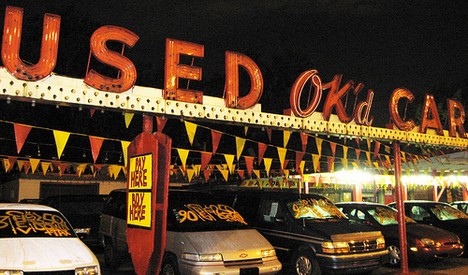
A century ago, the prevalence of public transportation enabled many Americans to take a bus or trolley car to work, school, shopping or health care providers. Today, many communities lack these public services and consumers instead rely on a personal vehicle to manage their day to day concerns. Beyond mobility, owning a car has become a gateway to economic opportunity.
Buying a car is more than finding a car you like. Finding the best financing for that car is just as important. How consumers shop for vehicles and financing was the focus of a late 2012 survey sponsored by the Center for Responsible Lending (CRL). Additional research on auto financing and sales is included in CRL’s latest research report, The State of Lending in America and its Impact on U.S. Households, (https://www.responsiblelending.org/state-of-lending/).
Consumer replies to the survey revealed that a growing number of all consumers were turning to “Buy Here, Pay Here” (BHPH) auto lots. BHPH dealers typically offer over-priced used cars and process all of their loans in-house. As a result, customers are required to make their payments at the dealership, as often as once a week.
In these types of sales, consumers with low-wealth and low credit scores become targets for predatory lending. CRL’s survey found that Black consumers accounted for 41 percent of BHPH customers. Of these consumers, 74 percent were unaware of mark-ups in car sales and finance, and fewer than half negotiated the cost of their monthly payment or cost of the vehicle.
And according to CRL, “Most BHPH dealers do not post prices on the lot. The dealer first assesses what kind of weekly or bi-weekly payment the consumer can be expected to pay. Then the consumer is told which car or cars are available to them and the price is set.”
The State of Lending report also found that most consumers are unaware that vehicle repossessions occur in 25-30 percent of these sales. CRL found that 70 percent of BHPH dealers install devices that can prevent car engines from starting and/or others that track the car’s movement. Should a customer become late or miss a payment, these devices help the dealer to quickly repossess the vehicle.
Typically most consumers are preoccupied with obtaining personal transportation with what appears to be an affordable, regular payment. Other factors such as the annual percentage rate (APR), down payments, or the cost of add-on services are often ignored by the consumer – to the advantage of the dealer. By maximizing profits on these older, high-mileage vehicles, most consumers do not realize how bad a deal they made until the car is repossessed.
The report further states, “The lack of transparency and regulation in auto finance has allowed different predatory practices to thrive throughout the years, creating more expensive and unsustainable loans for consumers. . . .If the dealer controls the financing and has the ability to adjust the terms of that financing, then the dealer has more opportunity to sell and finance additional insurance or warranty products. . . . Even if a consumer has financing in hand, the dealer will try to find a way to convince the consumer to opt for dealer financing, which increases the profit potential in the deal.”
CRL advises that with any car purchase, if possible, consumers should try to secure financing with a bank or credit union before arriving at the dealership. In this way, the consumer gains leverage when negotiating with the dealer. Car buyers should also remember that nearly every aspect of their car loan is negotiable, including the sales price, interest rate, trade-in value, length of the loan and prices of add-on products.
For BHPH dealers in particular, consumers should first pick a car, negotiate the sales price and negotiate the value of a trade-in vehicle. Applying for financing with the dealer before these details are resolved affords dealers an advantage that seldom benefits consumers.
When household budgets are tight and access to credit is even tighter, consumers would be wise to ask enough questions to gain a clear understanding of the terms and conditions of all financial transactions.
When a vehicle is the difference between getting or keeping a job, it is especially in the consumer’s best interest to become as knowledgeable as possible.
Charlene Crowell is a communications manager with the Center for Responsible Lending. She can be reached at: Charlene.crowell@responsiblelending.org.
